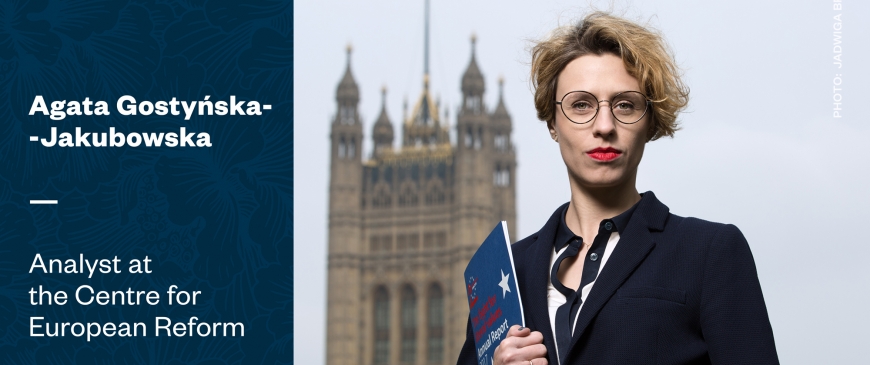
Exceptional women who inspire Polish community in Britain
The CER's Agata Gostyńska-Jakubowska is one of 18 women chosen by the Polish Embassy for a series of stories about modern Polish women, who through their work and commitment create a positive image of Poland on the British Isles.
I moved to London almost four years ago because I was fascinated by their intellectual level and high standards of discussions about political issues that are important to me. I liked the fact that Brits are not afraid of asking difficult questions and can present even most complex problems related to the EU decision-making process in a succinct manner.
Following one of my visits to the UK, I told my husband that it was one of a few places on Earth I could live in. First months of getting accustomed to the UK were rather hard as there are cultural differences between the Brits and us. It took me months to learn that if a colleague asks on Monday how my weekend was it is enough to say 'fine' instead of bombarding him with all the details.
I quickly discovered that the world of British think-tanks is very closed and often male-dominated. I remember that during one of the first meetings there was just one other woman in the room and it took my colleagues one hour to realise that I dared to ask a question. At that point, I understood that the most significant challenge would not be posed by the language barrier or cultural differences but by the need to build my brand in the environment largely dominated by male experts.
As I have been here for a few years now, my presence at seminars and my active participation in them no longer comes as a surprise to people in the industry.
In this regard being a woman requires extra effort: it is not enough to just wait at your desk for a call from somebody who would tell you that you are good at what you are doing. Our work requires a lot of determination and self-confidence. Many women tell me that they feel the need to always have to prove they have something interesting to say. And believe me, they do. They are often better than men.
People I work with are quite international, so I know that for them it is more important what I say than what is my accent or my place of birth. During the referendum campaign, however, some eurosceptics attacked me for being a 'biased' woman immigrant who 'agitates' for staying in the EU, although my analysis was based on pure facts and the think-tank I work at remained neutral in that discussion. In some weird sense, it even boosted my energy through strengthening my convictions that despite political pressure, what I do it does matter.
I was surprised that Brits so often look at the EU primarily through their interests and focus only on France and Germany, forgetting about the remaining 25 states, including Poland. I have been a regular visitor to Brussels for years now and I regularly work with people from across Europe, which is why I can assess which British demands have a chance to succeed with the entire EU. I sometimes had to bring British officials, politicians and some experts back down to earth.
However, I have got the feeling that British politicians do not always appreciate how lucky they are that London offers them the access to experts of various opinions from around the globe. During the referendum we often heard that 'this country has had enough of experts' and it got stuck in the minds of many of us. I am concerned that if we do not get a guarantee that our voice stays meaningful and that decision-makers will continue to be willing to consider our opinions even if they do not fit what they think, then many people may decide to leave.
I try to approach Brexit negotiations with a cool head, although it is not easy. After all, their results are going to influence the lives of millions of Poles in this country, including that of me and my family. However, I hope my analyses could help Brits to understand the ways of thinking on the continent and contribute to reaching a deal, which frankly is in the interest of both sides.
Agata Gostyńska-Jakubowska is a senior research fellow at the Centre for European Reform.
You can read more about the #Polka100 here
